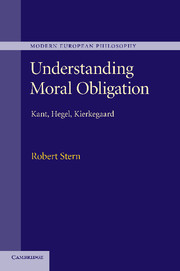Book contents
- Frontmatter
- Contents
- Acknowledgements
- References and abbreviations
- Introduction
- Part I Kant
- 1 Kant, moral realism, and the argument from autonomy
- 2 The argument from autonomy and the problem of moral obligation
- 3 Kant’s solution to the problem of moral obligation
- Part II Hegel
- Part III Kierkegaard
- Bibliography
- Index
2 - The argument from autonomy and the problem of moral obligation
Published online by Cambridge University Press: 05 January 2012
- Frontmatter
- Contents
- Acknowledgements
- References and abbreviations
- Introduction
- Part I Kant
- 1 Kant, moral realism, and the argument from autonomy
- 2 The argument from autonomy and the problem of moral obligation
- 3 Kant’s solution to the problem of moral obligation
- Part II Hegel
- Part III Kierkegaard
- Bibliography
- Index
Summary
In the previous chapter, we presented reasons for thinking that Kant did not intend to offer an argument from autonomy against value realism, so that the standard story of the history of modern ethics that begins from this assumption is misleading; that history will therefore be retold in later parts of the book. As a new starting point for that retelling, in this chapter I will suggest that the concerns about autonomy which take Kant in an anti-realist direction are raised not by the realist conceptions of value, but by accounts of the nature of moral obligation, particularly those divine command accounts which understand that obligatoriness in terms of God’s will. I will claim, therefore, that it is against this target, and not moral realism, that Kant’s argument from autonomy should be conceived. I will suggest that when viewed in this way, the argument itself can be made more plausible, and also better fits the textual evidence in Kant; in later chapters we will then see how Kant’s own account of obligation works, and how this account was challenged by his successors, showing how Kant’s legacy is different from the one standardly proposed.
The problem of moral obligation
As we saw in the previous chapter, one difficulty constructivist interpreters have had in attributing the argument from autonomy to Kant is in finding a way to make it compelling as a critique of value realism: why, if there is such an ‘independent order of value’ (in Rawls’s phrase), should this thereby render us heteronomous? We saw how Rawls says remarkably little to spell out this worry, while attempts to do so by others in Kant’s name seemed to be unsuccessful, both philosophically and interpretatively.
- Type
- Chapter
- Information
- Understanding Moral ObligationKant, Hegel, Kierkegaard, pp. 41 - 67Publisher: Cambridge University PressPrint publication year: 2011

